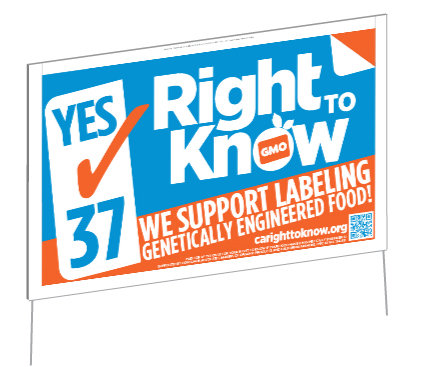As we approach election day, my neighborhood in Berkeley has sprouted dozens of blue and orange yard signs supporting Proposition 37, which would require the labeling of genetically modified foods.
The “Right to Know” has become the rallying cry of the initiative’s backers, who meet any criticism of the initiative, its motivation or of the “science” used to back it with the same refrain: “We have the right to know what’s in our food!!”.
It is, of course, hard to argue that people should not have this right. I am a very strong supporter of consumer rights and of providing information, even if people use it stupidly. But, I have closely followed the debate over Prop 37, reading and listening to and occasionally arguing with its proponents. And I have been struck throughout by just how little backers of the initiative actually want to know anything.
The law would require the application of a catchall “Contains GMOs” label to any product containing any ingredient from a genetically modified plant, animal or microbe. This language reflects the belief of its backers that GMOs are intrinsically bad and deserve to be labeled – and avoided – en masse, no matter what modification they contain or towards what end they were produced. This is not a quest for knowledge – it is a an attempt to reify ignorance.
Sure, if you think, as some people do, that moving genes from one species to another is some kind of crime against nature that risks destroying life on Earth, a blanket prohibition against GMOs makes sense. But the bulk of Prop 37 supporters I have heard or spoken to express more rational concerns, primarily:
- The specific modifications in common GM crops – the production of insecticidal proteins or of genes for herbicide tolerance – make them unsafe for human consumption.
- Whether safe or unsafe for humans, GM crops encourage an industrialized monoculture approach to farming that is unsustainable and bad for the planet.
- GM technology is wielded by multinational conglomerates like Monsanto who have little regard for the public interest and produce GM crops solely to make more money, and who use intellectual property in their creations to squeeze farmers and increase their control over global agriculture.
Whether one agrees with these points or not – I disagree with 1, but agree with 2 and 3 to varying degrees – none of them apply uniformly to all GMOs.
If you’re worried that the GMOs you’re eating might kill you, then you should want to know what specific modification your food contains. I don’t think there is any harm in eating food containing the insecticidal “Bt” protein, but even if it were dangerous this would have no bearing on the safety of golden rice.
Similarly, if you are concerned that the transgenic production of plants resistant to certain herbicides encourages the excessive use of herbicides and triggers an herbicide treadmill, then you can boycott crops containing these modifications. But it doesn’t make sense to oppose the use of crops engineered to resist diseases, or to produce essential vitamins. Indeed, there are many, like UC Davis’s Pam Ronald, who believe that advanced development of GMOs is the best way to advance organic and sustainable agriculture. You may disagree with her, but it should be clear that the effect on agricultural practices varies depending on the specific plant and type of modification being considered.
And, while I share much of the disdain anti-GMO advocates feel for the business practices of companies like Monsanto, not every seed company uses the same practices, and there are plenty of academic researchers, non-profits and companies laboring to use GMOs to solve major challenges in global food production, distribution and nutrition. To hamper what they are doing in the name of sticking it to Monsanto – whose questionable business practices extend far beyond GMOs – makes no sense.
Thus the very reasons supporters of GMO labeling cite for labeling GMOs demand more information than “This product contains genetically modified ingredients”. And it’s the central irony of Prop 37 that in backing the bill they are, in tangible ways, working to ensure they do not get information that will be actually useful to them.
Some backers of Prop 37 say that it is the first step towards more comprehensive food labeling. If, in the push to pass the initiative I saw a thirst for real knowledge and understanding of where crops come from and how food is produced, then I’d share their optimism.
But everything I’ve seen from proponents of Prop 37 suggests something else – a lazy and self-satisfied acceptance of an internally incoherent piece of legislation that, rather than giving consumers the “right to know”, will actually protect their desire to know nothing.

6 Comments